No ideas or accord

Recent surveys by various research centers are graphic evidence that none of the current leaders — People’s Union “Our Ukraine,” Party of the Regions, Yulia Tymoshenko Bloc, Socialist Party, Communist Party, etc. — stand a chance of winning more than half the seats in the next parliament. In other words, no party will gain a decisive advantage either to pursue its own legislative course or form a cabinet as it sees fit. While expanding on the main discussions of the above-mentioned favorites, experts are paying less attention to those who are still in the shadows. But among them are battle-hardened politicians, and they are not likely to surrender their positions without a fight. Besides launching various projects calculated to trigger considerable social reverberations, like the referendum on Ukraine’s NATO and SES membership, the Social Democratic Party of Ukraine (United) began conducting propaganda work a long time ago and continues to do so in the regions, particularly in Zhytomyr oblast. Its activists mostly work with individual voters and are well aware of their moods. International practice and the short history of electoral collisions in independent Ukraine indicate that individual work, given certain conditions, can be a serious if not crucial factor of electoral success. Those who have hastened to bury the SDPU(U) may be in for a big surprise on the day the votes are counted: they will see that this party passed the parliamentary qualification barrier and has a strong foothold in local governing bodies. It is also possible that its supporters are consciously not expressing their sympathies in surveys (remember the SPU and BYuT during the 2002 campaign, when sociologists almost unanimously predicted that neither would get seats in parliament?).
Apart from portraying the starting-line alignment of forces that will take part in the election race, these sociological polls give reason to believe that the next parliament will not be very different from the present one (we’ll see once the voters’ lists are published) and the balance of political forces will be approximately the same. The reshuffles in parliament’s current composition and the maneuvers of parties and party blocs provide adequate grounds for such prognoses. If they prove correct, after the elections we will again see no stable coalitions capable of rallying the majority of parliamentarians. Without such coalitions parliament and cabinet will again be unable to conduct uniform and promising policies aimed at achieving socially significant goals in both foreign and domestic political realms, which are extraordinarily interconnected in our conditions. This will mean a continuation of the worst traditions of the Ukrainian body politic, which still has not been able to reach an agreement and thus clarity in viewing Ukraine’s future and its paths of development. In the concrete foreign political dimension this will mean that Ukraine will be certainly lag behind Russia as a WTO member, with all the attendant negative consequences for our country; it will be some time before Ukraine is invited to join the European community of nations, if ever; it will not join NATO; and will be unable to substantially enhance its status as an independent state. In domestic affairs, economic competition will not be actively stimulated, and decisive steps will not be taken to restructure the economy. Public resources will continue being embezzled under the mottos of state protectionism of certain sectors. In general, even if there is progress in the material and cultural spheres, its rate will not conform to society’s needs.
The most paradoxical aspect of all this is that such a situation may develop in the aftermath of the democratic elections. Partially, and to a lesser degree, this depends on the fact that various social strata are not fully aware of their current and more general interests. During the Orange Revolution a powerful demand for freedom and democracy was formed by most Ukrainians, but so far it is not sufficiently manifested in the applied aspect. The political elite represented in the parties and blocs that will vie in the elections, especially those claiming leading roles, should have offered programs to society, aimed not only at the next couple of years but the long term. The key political operators should also have agreed among themselves about their view of this country’s basic values and issued a joint declaration to the effect that they will refrain from actions during the election campaign that might ruin them. As it is, they are staking on “personal arms,” the way they did during the previous campaign — in other words, they are counting on certain leaders as well as technological devices for manipulating social problems or openly demagogical, at times anti-Ukrainian, slogans. If this dominant trend persists, then a truly structured parliament dominated by political forces rallied round the idea of a truly independent Ukraine-forces that would actually champion democracy, individual and economic freedom- will appear no earlier than these elections.
Выпуск газеты №:
№38, (2005)Section
Day After Day





